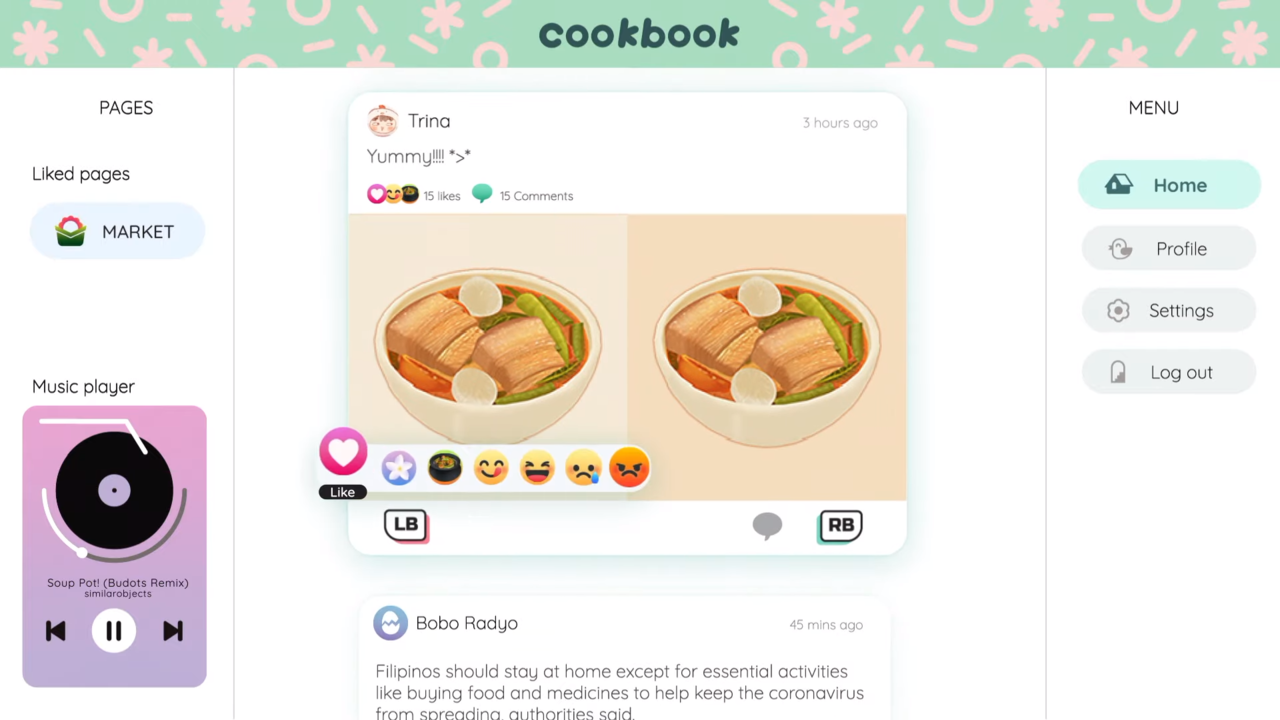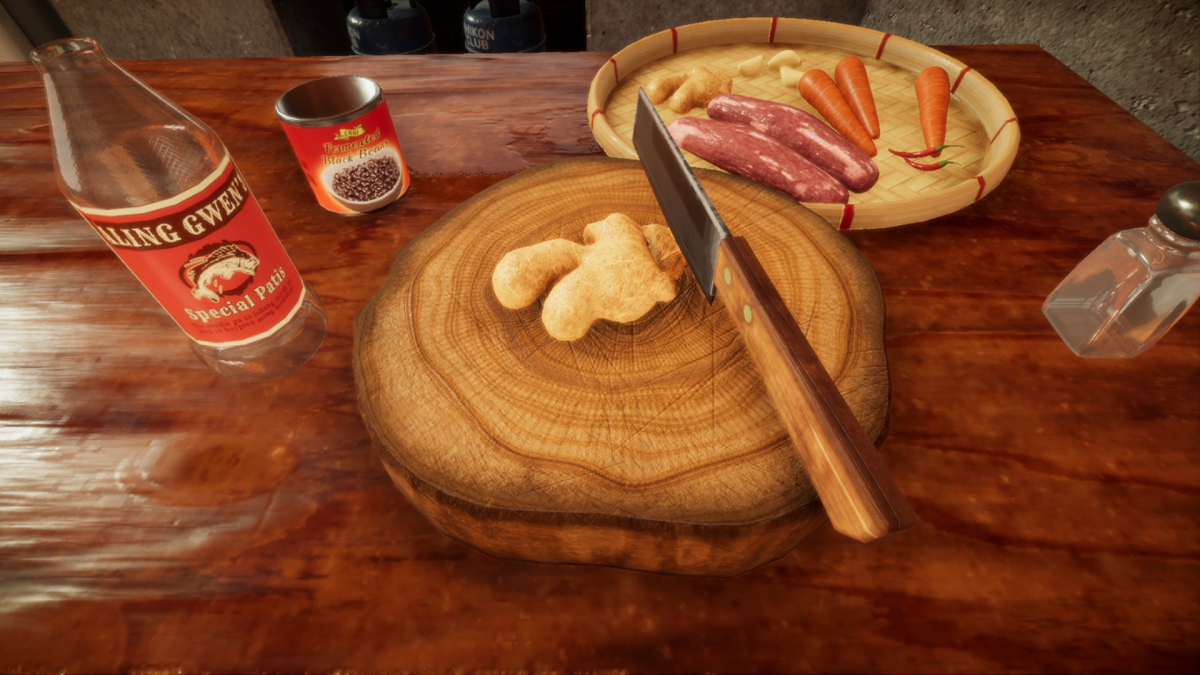First shown off during the March ID@Xbox showcase, Soup Pot is the debut title of Manila developer Chikon Club. The adorable-looking cooking game captured my attention with the reveal that it possesses no fail states (a rarity for cooking games), so I caught up with Chikon Club's Trina Pagtakhan and Gwendelyn Foster to talk about how the game grades the player without failing them.
Eventually, our conversation turned to other aspects of Soup Pot, such as the game's connection to real-world events. Soup Pot sees you play as someone stuck indoors during a pandemic, teaching yourself how to cook in order to pass the time and have something to eat. Your only human interaction are the chat rooms for your livestreams that document your efforts and conversations with the people delivering ingredients to your door. You also fill your downtime by scrolling through a fictional cooking-based social media site called Cookbook, where you'll remain apprised of what's going on in the world. So even though Soup Pot is a cute, humor-focused exploration of Filipino and Southeast Asian cuisine, there's a meaningful underlying narrative thread to the game too.
My conversation with Pagtakhan and Foster is transcribed below. Edits have been made to aid in readability. Soup Pot is scheduled to launch for Xbox Series X|S, Xbox One, and PC in August.
Why make a game with no fail states? Cooking games have kind of almost always included some form of grading system.
Pagtakhan: Oh, but we do have a different way in which the game judges the player. So we didn't want to put in a fail state because we wanted to encourage experimental cooking and having fun in the kitchen. So for the judging part, there's this chat box that's filled with your relatives who are either roasting you or praising you for the decisions you make in the kitchen. So if you put too much salt, they're going to go like, "Oh, that's too much salt. What are you doing?" And then if you bake it perfectly, they'll go like, "Oh, perfect, perfect. That's my niece right there."
Hearing the food make little sounds as you pick it up and cook it is really cute--where did the idea for the food to "talk" come from? Why add a feature like that?
Pagtakhan: Oh, when we first started making this game, we initially just wanted to make a simple cooking game, and then it somehow evolved into a meme game in the process. And we also had Gian, our audio designer who was just making songs for us, saying these ingredient names in a gremlin voice. And then he added it into the game, and he kind of edits it to make it sound really cute. So, I think that's one of the reasons why our game blew up in the first place.
Is the player the only character in the game, or are there other characters that they can interact with?
Foster: So, we are actually in the process of implementing a chat option. In the marketplace, you can ask for delivery. I don't know if you've been in the Facebook marketplace, or if it's the same there as it is here, but whenever somebody posts like, "Here is 70 kilos of fresh radish for a thousand dollars," and then somebody annoyingly goes, "How much?" even though it's already in the description. So that's one of the things you can interact with.
You can also interact with the delivery people--this is a pandemic, that's the reason why you're streaming in the first place: You're suffering from the pandemic, and you have to feed yourself. So that's why you're chatting with new people.
Oh, so this game takes place during a pandemic? Does Soup Pot have real-world connections to COVID-19 then that will be explored through the Cookbook social media app?
Pagtakhan: On the newsfeed on Cookbook, we will be putting in fake news articles, but they'll be somewhat similar to real-world COVID-related events, like how the prices of the vegetables hike or plummet and how that affects the market.

So how does that news feed work? Will Cookbook randomly update over time, or does the player have to do something in order to see new posts?
Foster: It's both [laughs]. We have a timeline, but once you finish a certain number of recipes, then certain news events trigger--we wanted to do non-linear storytelling. So the news posts come in depending on the progress of the player. It's initially a bit of fun, and then [the news] gets alarming. But the whole point of the social media is that it makes the downtime while cooking more enjoyable. And, in real life, people's behavior during their downtime usually has them go through their phones. So we want to mimic that. There is evergreen news that just comes in at any time, whether it's like facts about customs or beliefs. And then we have breaking news.
Do you get a sense of who someone is based on what they post to Cookbook, or how they comment on news posts?
Foster: Yeah. You will eventually discover who does fake news because of the pandemic. There is so much misinformation. It's to recreate [the real-world]. There are certain things that would have gotten better if the proper information had been independently disseminated earlier.
Sounds like Soup Pot is a bit of a political game hidden beneath the trappings of a cutesy cooking game then.
Pagtakhan: On the surface, it's a meme game, but it is a political game in a way that it informs people that there is absolutely really important stuff happening outside. But it's not freaky. It's just there to kind of act as a reminder for you. It's a funny game, but also kind of serious.
Ah, so you got to dig past the meme to see the truth.
Pagtakhan: Yeah, you got to dig past the meme.
Is there a way to capture your creations in the game--like, take photos of your food or write down your own recipes?
Foster: Yeah. You can plate your dishes in any way, and then--essentially, you have like a profile where you can post your creation.
Pagtakhan: Our UI and UX director is also doing this avatar creator inside the game too so you can have a fake profile picture.
Foster: And then your profile is essentially like a real-life profile. You can post typewritten posts, and every time you take a photo, you can look back later and see your achievements.

Are there aspects of the game that take inspiration from Filipino or Southeast Asian culture beyond the food--the layout of the kitchen, for example?
Pagtakhan: Actually, for the kitchen, aside from the Filipino kitchen that we showcased in the trailer, we're also planning to add a Japanese and a Korean kitchen via DLC. At launch, we'll be showcasing the Filipino food alongside the Japanese and the Korean food DLC so that you can recreate more recipes.
Aside from that, people commenting on your stream, your relatives, they're rooted in Asian culture. So you usually have these really judgy aunties, and so the chat will say things like, "Oh no. Why are you cooking like that? You should just go wash the dishes or something." And then some uncles are going to go, "Oh, good cooking. Now you can marry a husband." Things like that. And, back to the social media aspect, of course, there'll still be some of those trolls, which will depend on the news, what kind of people you encounter, and what personalities they all have.
Foster: To answer your question, the more DLC that we have, essentially the more culture your social media will have. Like the Philippines was a colony of Spain for so long, so when you look at Mexican food, there are similar influences--like we actually have handmade tortillas here, though we do not make them like the way Mexicans make their corn tortillas.
We were also occupied by the Japanese before, so we actually have a lot of Japanese people, in general, here--they've been integrated into our culture. You learn how to use chopsticks at an early age here, both from the Chinese and Japanese influence. And then we have a lot of Koreans studying abroad in the Philippines. So there's always a Korean grocery down the street. There was something that I read--I think a couple of years ago--that said that Brazilian food and Japanese food, even though they're separated by oceans, have similar methods of preparation.
We're only starting with Filipino food because it's what we know. But at the same time, moving forward, I mean, even with the internet and everything, and even pre-pandemic, the more exposed you are to food, the more you realize how we're all the same anyway.
So that's why there are certain recipes in Filipino culture that we found in Portuguese or in Brazilian culture. I feel that, down the line, the more recipes that we have, the more integrated the cultures will apparently be. Especially in a world where there's currently no international travel and there's racism, the best way to just connect with people is through food that you're sharing.

